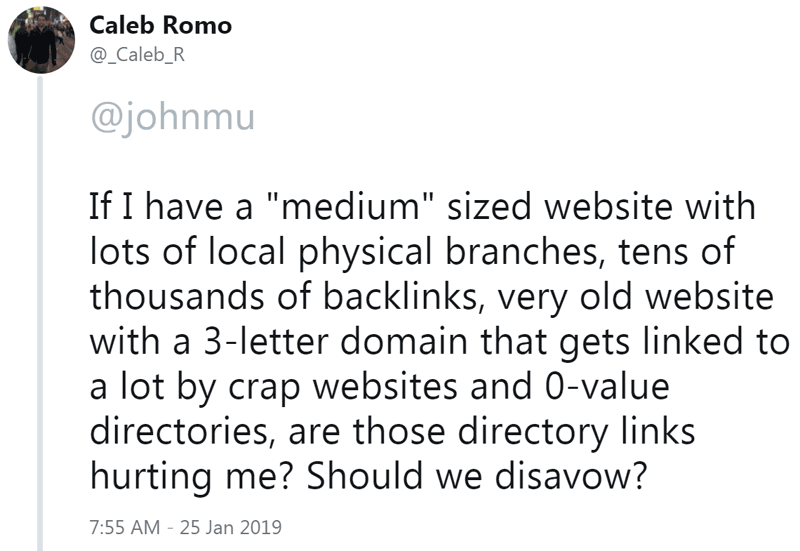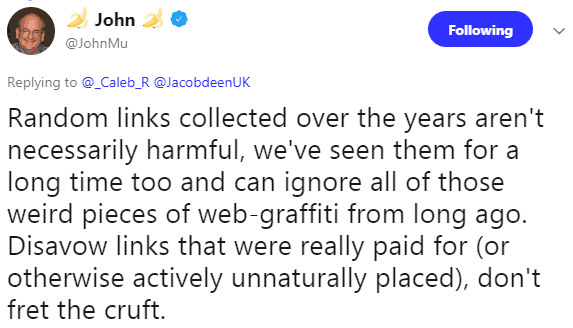In a recent Webmaster Hangout, John Mueller discouraged the use of the disavow tool. Apparently his comments have inspired more questions. He keeps getting asked about it. In a tweet and in a Reddit post, John Mueller directly states that his comments in the video about the proper use of the disavow tool were specifically recommending it only for links that you were directly responsible for.
John Mueller on Best Use of Disavow Tool
In a recent Reddit discussion about negative SEO, someone linked to the recent Webmaster Hangout where disavows were discussed. The Reddit member suggested that the John Mueller recommended using a disavow to get rid of the bad links.
Someone stated in Reddit:
“…recently John Muller from Google confirmed that bad links can in fact hurt your rankings in some cases…”
To which John Mueller replied:
“This was specific to links that you’ve built yourself, not about negative SEO.”
That statement enhances the context of the statements he made in that Webmaster Hangout. John Mueller is discussing low quality links that were under the control of the SEO.
Of course, he’s not suggesting that people self-report all links, even if they are working. The statement about disavowing known spam links is within the context of a site that’s been penalized.
John Mueller Clarifies Using Disavow for Random Links

“If I have a “medium” sized website with lots of local physical branches, tens of thousands of backlinks, very old website with a 3-letter domain that gets linked to a lot by crap websites and 0-value directories, are those directory links hurting me? Should we disavow?”
“Or does it not matter, and Google knows these websites link to sites like mine for no reason on a daily basis and we don’t seek these links out?”
“Random links collected over the years aren’t necessarily harmful, we’ve seen them for a long time too and can ignore all of those weird pieces of web-graffiti from long ago. Disavow links that were really paid for (or otherwise actively unnaturally placed), don’t fret the cruft.”

That’s very unambiguous and straightforward.
Two Takeaways:
- Use the disavow if your site’s lost rankings and you suspect that it’s because of links that you’re responsible for, like paid links.In my opinion, based on experience and observations, difficult to catch paid links can lose their ranking ability in about three months. Easier to catch manipulated links (PBN and paid) can be caught within a few weeks.
- It’s not necessary to use the disavow links for random links that you have nothing to do with.
Google Hides the Disavow Tool on Purpose
John Mueller revealed in the Webmaster Hangout that Google purposely hides the disavow tool so that people have a hard time finding it. The reason is because Google has consistently said that it’s not necessary for most people to use except if you actually know about it. This has been consistent since the first day of the disavow tool to now.
In the Webmaster Hangout Mueller asserted:
1. Vast majority of sites don’t need to use it.
2. He wouldn’t go looking for bad links to disavow then says, but if you know about bad links then go ahead and disavow them.
Origin of the Disavow Tool
The origin of the disavow tool is from the SEO community. SEOs asked for the disavow tool so that they could get out of the Penguin penalty.
Google was reluctant to offer the tool. The SEO community kept asking for it. So eventually Google released it, reluctantly, but with the instructions that it’s ONLY for use for links you know about.
Google Has Been Consistent About the Disavow Tool
Google has been consistent about this point that it’s only for links you know about because you’re responsible for them.
Here’s my transcription of what John Mueller said in the Webmaster Hangout:
“…I think for the vast majority of sites that kind of have that normal mix of things where like you followed some bad advice in the past, and it’s like you moved on and things are pretty natural now, then they really don’t have to.
That’s kind of the goal with all of this. And that’s why the disavow tool isn’t like a main feature in Search Console. You kind of have to look for it explicitly. That’s all done on purpose. Because for most sites you really don’t need to focus on links that much.
What I kind of do like about the disavow tool though is that if you’re worried about this you can still go there and be like ok, I know there is like these handful of things that we did a couple of years ago and I’m really worried about that. Then disavowing them, from my point of view is not a problem.
I wouldn’t go out and specifically search for all of that stuff. But if you know about it and you’re really worried about it, then you can kind of take care of it.”
That’s very clear and unambiguous advice on when to use the disavow tool.
Read entire Reddit discussion here:
More Resources
- Too Many Links: Strategies for Disavow & Cleanup
- Google Discourages Use of Disavow Tool. Unless You Know the Bad Links
- 38% of SEOs Never Disavow Links [POLL]
Images by Shutterstock, Modified by Author
Screenshots by Author, Modified by Author


